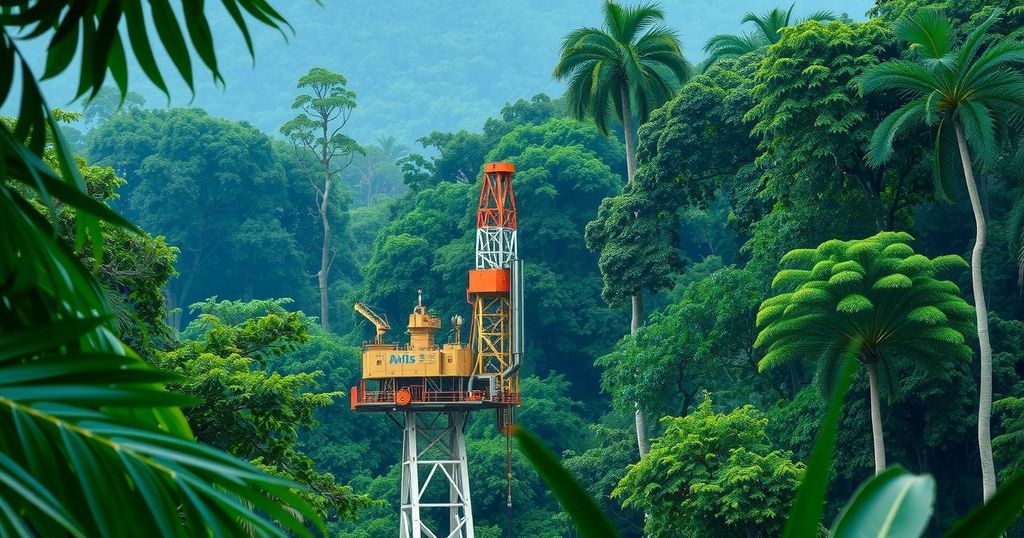Brazil, ahead of hosting COP30, is pushing for oil drilling in the Amazon, raising concerns among environmental groups. President Lula acknowledges humanity’s continued reliance on fossil fuels, despite extreme climate impacts. Critics oppose the government’s entry into the Charter of Cooperation with oil-producing countries, arguing it contradicts efforts for a transition away from fossil fuels. The environmental licensing process for new drilling is under scrutiny as political pressure mounts on regulatory agencies.
As Brazil prepares to host COP30 in the Amazon, President Luiz Inácio Lula da Silva’s government is advocating for new oil drilling in the region. Despite the Amazon’s significance as the world’s largest tropical rainforest, Lula acknowledges humanity’s reliance on fossil fuels while expressing hope for a future without them. Recently, Brazil’s National Energy Policy Council approved the country’s entry into the Charter of Cooperation with oil-producing nations, which has drawn criticism from environmental groups due to its implications for climate policy.
Critics have expressed disappointment, arguing that Brazil should lead a transition away from fossil fuels. “This is a disappointing setback for everyone who relies on the Brazilian government to lead a just transition away from fossil fuel exploration—an essential step if we are to survive on this planet,” stated André Guimarães from the Amazon Environmental Research Institute.
According to 350.org, Brazil’s investments in its oil and gas sector surged last year, positioning it as the third-largest investor in this domain. Without new exploration, the country’s oil output would decline significantly, yet plans for new projects could increase production by 36% over the next decade. President Lula defended Brazil’s oil ambitions, pointing to other nations exploiting fossil fuels, arguing, “Look at the United States; see if France is worried. No, they are exploiting as much as they can.”
Lula intends to use profits from oil exploration to fund energy transitions, a claim met with skepticism. Environmentalists criticize this rationale, likening it to suggesting that smoking more could fund lung cancer treatments. Lula’s previous government had promised to invest oil revenues in health and education, but during an economic crisis it redirected those funds elsewhere.
The Brazilian government is pursuing an environmental license for exploratory oil drilling in the Foz do Amazonas Basin; however, such a license was previously denied due to inadequate environmental impact assessments. Authorities from IBAMA, the country’s environmental agency, noted significant risks involved without a thorough assessment of sensitive ecosystems in the region.
Despite previous setbacks, the administration is negotiating for a potential approval of the drilling license. Political pressure from Lula may influence IBAMA’s decision, which raises concerns among environmentalists about prioritizing political expediency over environmental integrity. The environmental public servants’ association condemned such pressures, emphasizing that thorough evaluations are vital for safeguarding ecosystems and local communities.
Efforts to expedite the environmental approval process involve modifying evaluation criteria, which environmentalists decry as detrimental. Changes include minimizing requirements for assessments of noise pollution and circumstantial studies that could restrict drilling areas. Ultimately, the final decision hinges on the emergency response plan presented by Petrobras, which must adequately address wildlife rescue in case of oil spills.
Brazil’s intention to expand oil drilling in the Amazon raises significant concerns as it approaches COP30. While President Lula indicates that profits from oil exploration will finance a transition to clean energy, environmentalists remain skeptical. Criticism mounts regarding the potential environmental detrimental effects, further complicated by political maneuvering that may undermine rigorous environmental protections. The outcome of the environmental licensing process will significantly impact Brazil’s stance in the global climate dialogue.
Original Source: www.climatechangenews.com




